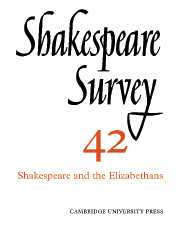Book contents
- Frontmatter
- ‘Jack hath not Jill’: Failed Courtship in Lyly and Shakespeare
- Truth and Art in History Plays
- Chronicles and Mythmaking in Shakespeare’s Joan of Arc
- King John and Embarrassing Women
- Golding’s Ovid, Shakespeare’s ‘Small Latin’, and the Real Object of Mockery in ‘Pyramus and Thisbe’
- Ovid and the Sonnets; or, did Shakespeare Feel the Anxiety of Influence?
- The Play of Sir Thomas More and Some Contemporary Events
- ‘Nobody’s Perfect’: Actors’ Memories and Shakespeare’s Plays of the 1590s
- The Boyhood of Shakespeare’s Heroines
- Shakespeare’s ‘Brawl Ridiculous’
- Shakespeare’s Handwriting
- Shakespeare Performances in England, 1987–8
- Professional Shakespeare Productions in the British Isles, January-December 1987
- The Year's Contributions to Shakespearian Study 1 Critical Studies
- 2 Shakespeare’s Life, Times, and Stage
- 3 Editions and Textual Studies
- Books Received
- Index
2 - Shakespeare’s Life, Times, and Stage
Published online by Cambridge University Press: 28 March 2007
- Frontmatter
- ‘Jack hath not Jill’: Failed Courtship in Lyly and Shakespeare
- Truth and Art in History Plays
- Chronicles and Mythmaking in Shakespeare’s Joan of Arc
- King John and Embarrassing Women
- Golding’s Ovid, Shakespeare’s ‘Small Latin’, and the Real Object of Mockery in ‘Pyramus and Thisbe’
- Ovid and the Sonnets; or, did Shakespeare Feel the Anxiety of Influence?
- The Play of Sir Thomas More and Some Contemporary Events
- ‘Nobody’s Perfect’: Actors’ Memories and Shakespeare’s Plays of the 1590s
- The Boyhood of Shakespeare’s Heroines
- Shakespeare’s ‘Brawl Ridiculous’
- Shakespeare’s Handwriting
- Shakespeare Performances in England, 1987–8
- Professional Shakespeare Productions in the British Isles, January-December 1987
- The Year's Contributions to Shakespearian Study 1 Critical Studies
- 2 Shakespeare’s Life, Times, and Stage
- 3 Editions and Textual Studies
- Books Received
- Index
Summary
Lives, like texts, may be read many ways. Peter Levi’s The Life and Times of William Shakespeare is the reading of a distinguished poet and Oxford Professor of Poetry, immersed in and thrilled by the range of Shakespeare’s verse, but less conversant with the scholarship of Elizabethan history, particularly theatrical history, and essentially out of sympathy with the modern ‘reductionist’ strain of academic Shakespearian biography, pre-eminently represented by S. Schoen-baum’s Compact Documentary Life. The temperamental difference between the two ‘readings’ is best indicated by their reactions to ‘The Phoenix and Turtle’. Schoenbaum originally overlooked the poem altogether, but grudgingly describes it in the revised edition as ‘a much discussed curiosity . . . [which] shows Shakespeare in the unfamiliar role of nonce poet’ (pp. 327–8). For Levi, it ‘is the most breathtaking of all his poems, and I have heard old critics, devoted to poetry of many kinds all their lives, agree on it as the greatest poem in the English language’ (p. 214). Shakespeare the writer of supreme verse, rather than Shakespeare the practical man of theatre, is Levi’s hero, and there is nothing inherently wrong with that – odd though it may sound to late twentieth-century ears.
- Type
- Chapter
- Information
- Shakespeare Survey , pp. 185 - 200Publisher: Cambridge University PressPrint publication year: 1990

